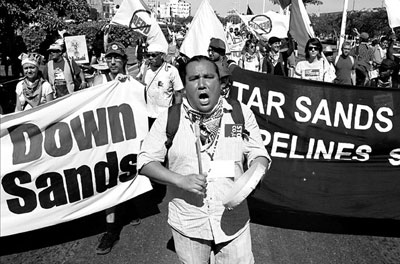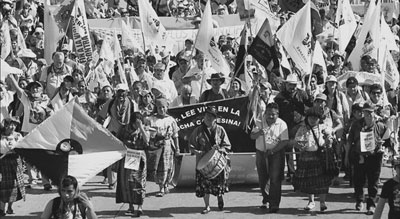 The UN Convention on Climate Change (COP16) of Cancun has been a failure: could not find any agreement that binds countries to reduce emissions of contaminants. Will therefore not be avoided the devastating effects caused by the continuous rise in temperature: according to recent scientific reports, 300 thousand people die each year for disasters related to climate change.
The UN Convention on Climate Change (COP16) of Cancun has been a failure: could not find any agreement that binds countries to reduce emissions of contaminants. Will therefore not be avoided the devastating effects caused by the continuous rise in temperature: according to recent scientific reports, 300 thousand people die each year for disasters related to climate change.
The failure was announced before the start of the work of the Assembly, also from the same Patricia Espinosa, President of COP16 and Mexican Secretary of Foreign Relations. According to some analysts, the pessimistic attitude was in fact a strategy to "prepare the ground" by providing for the worse, any agreement out of the COP16 would be considered a triumph. And so it was the thin document, accepted by the applause of the Assembly, was presented to the public as an advance in the fight against global warming, even though in reality is not going one inch in this direction.
The representatives of the governments in Cancun had pledged to give continuity to the objectives set by the Kyoto Protocol, in force until 2012, which sets a binding cap on CO2 emissions for 37 industrialized countries. It is not enough when you consider that the 137 countries that ratified it produces only 55% of greenhouse gas emissions, while the United States, which alone account for 30% of CO2 emissions, have signed but never ratified .
The document that comes out of the COP16 of Cancun is confused and full of gaps. It argues for example that you must come to an agreement as soon as possible to extend the Kyoto Protocol in order to give continuity to the promises, but does not say how, when, where and under what terms. The text also reaffirms the commitment by developed countries to create a fund to help the poorest countries in the event of natural disasters, but it is not clear whether it will aid or loans, or how and by whom will be managed. The fear of social movements is that the fund is entrusted to the World Bank, who will manage to impose its structural adjustment plans, allowing that money to countries in need in exchange for liberalization and privatization of key sectors of their economies.

 The ambiguous role of Evo Morales
The ambiguous role of Evo Morales
Another point on which social movements are very critical is about the commitment made by governments to strengthen the Clean Development Mechanism established under the Kyoto Protocol that allows industrialized countries to continue to pollute in exchange for green investments in the countries of South. Beyond the basic philosophy, very hypocritical, criticism is leveled at the fact that projects like the construction of hydroelectric plants or cultivation of agrofuels will be treated as green investments. Several times during the Forum for Life, Environmental and Social Justice - organized parallel to COP16 from Via Campesina, the Mexican Electricians Union (SME) and the National Liberation Movement - we talked about these projects as "false solutions ". Many studies show how it actually contribute to global warming, and their real purpose is therefore to create profit for transnational corporations.

"Villagers cool the planet," read the entry on the wall of the space that housed the Forum of Via Campesina, during which they presented data showing that 25% -30% of greenhouse gas emissions are caused by industrial agriculture. What then asks the peasant movement is a return to family farming and small-scale, and the recognition by governments of the agreements of the First Peoples' World Conference on Climate Change and Human Rights of the Mother Earth of Cochabamba, the Bolivian government brought to the negotiating table. The COP16 has not considered the proposal from the Bolivian Andes and the government, unlike the other representatives of the countries of ALBA has not given his consent to the arrangement came out of Cancún.
On the eve of the closure of negotiations Bolivian President Evo Morales spoke at the Forum of Via Campesina. Greeted by applause, and choruses, the compañero Evo said that to contain global warming is a radical systemic change: the modes of production and consumption of capitalism can not lead us to the fact that climate catastrophe. Morales has been accepted as a true hero, and was present at the Forum before coming in the flesh: in the words of some speakers, and photos during the running of Via Campesina many protesters wore the chest.
The presence of Morales was criticized by the integral of Anti-C @ P, an international network of organizations and anti-capitalist group, contrary to the cult of the individual and no leaders or representatives. "Social movements must retain the horizontal decision-making, " said Morales during his speech, forgetting perhaps that his role as Head of State is moving in parallel to a top-down conception of politics.

"We are here to say that governments do not accept the false solutions. The only solution is that large companies and rich countries stop emitting greenhouse gases, because they are the main responsible for the contamination, "said Rodolfo Chavez CECOP - La Parota (Guerrero, Mexico), whom I met in the march Via Campesina.
But have been they, the rich countries, to decide the fate of humanity in the COP16. Several times during the Forum has been pointed out how ironic that the place where the negotiations took place was called Moonpalace: they on the moon, we on earth.

